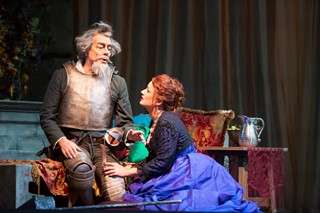|
Back
A Knight and his Windmills in the Windy City Chicago
Lyric Opera
11/19/2016 - & November 23, 28, December 1, 4, 7, 2016
Jules Massenet: Don Quichotte
Ferruccio Furlanetto (Don Quichotte), Clémentine Margaine (Dulcinée), Nicola Alaimo (Sancho), Diana Newman (Pedro), Lindsay Metzger (Garcias), Jonathan Johnson (Rodriguez), Alec Carlson (Juan), Takaoki Onishi (First Servant), Emmett O’Hanlon (Second Servant), Bradley Smoak (Bandit Chief), William Combs, Matthew Carroll, John Concepcion, Ronald Watkins (Bandits)
Lyric Opera of Chicago Chorus, Michael Black (Chorus master), Lyric Opera of Chicago Orchestra, Sir Andrew Davis (Conductor)
Matthew Ozawa (Stage director), Ralph Funicello (Set designer), Missy West (Costume designer), Chris Maravich (Lighting designer), August Tye (Choreographer)

F. Furlanetto, C. Margaine (© Todd Rosenberg)
Massenet’s Don Quichotte has not managed to become part of the standard repertoire like his biggest hits Manon and Werther. In part, it’s due to its being an atypical opera and in a larger part because it requires a charismatic bass as its central hero. Since Feodor Chaliapin created the role in 1910, Nicolai Ghiaurov, Samuel Ramey and Ferruccio Furlanetto have been its main champions. Amazingly, the Lyric Opera of Chicago has performed this rarity with the latter three. The opera is atypical as it is not about star crossed lovers who struggle with circumstances and rivals, but it’s about idealistic chivalry and noble platonic love, a concept remote from today’s lifestyle. Dulcinée yearns for something greater than being admired and loved for her physical beauty. Don Quichotte believes in chivalry, honesty and devotion. In his quest, he imagines windmills to be monsters, a pig and a herd of sheep to be bandits, promises to bestow on his loyal squire Sancho Panza a chateau and an island that are pigments of his imagination. What is so wrong about living in a world where reality is seen distortedly to sooth one’s soul. Dulcinée is touched and enamoured with Don Quichotte’s noble soul, and out of honesty declines his marriage proposal. She is too wild and joyous for marriage and being an honest courtisan, she cannot accept to fool the old man into believing his own fantasy of her being a lady. Chivalry and platonic love are indeed too subtle to make the opera a perennial hit.
Other than a couple of Russian operas, there are very few operas where a bass is the lead as is the case with this opera. Ferruccio Furlanetto has made Don Quichotte his signature role since 2012. It is an ideal role for the veteran bass, as charisma, acting skills and expressiveness are its biggest requirements. He manages to sing with amazingly clear French diction, a feat for most Italian singers. Both his Act III prayer “Seigneur, prends mon âme, elle n’est pas méchante” as he is be put to death by the bandits and his Act V death scene were especially moving thanks to Furlanetto’s understatement. The inward pathos of Massenet’s music would not have worked with an over the top delivery. Clémentine Margaine is the perfect Dulcinée, Don Quichotte’s idealized vision of womanhood, with her warm voice and elegant style. Her Act IV aria “Lorsque le temps d’amour a fui”, a melancholy introspective piece, allows her to covey Dulcinée’s disenchantment with ephemeral pleasure. It is hard to think of a non-French native speaker doing justice to this role. Margaine’s diction is so clear that one can understand every word, and her natural emphasis on words such as “tendresse”, “peine”, “impure”, “indigne” and “un fou sublime” in the Act IV duet with Don Quichotte “Oui, je souffre votre tristesse” makes her loving rejection ever so moving. Nicola Alaimo’s Sancho is beautifully understated and avoids vulgarity. He strikes the right balance between his comedy and his master’s noble earnestness. His extroversion is a compliment to Don Quichotte’s introversion. Alaimo’s earthy voice contrasts well with Don Quichotte’s. His French diction is not at par with the other two leads, but the voice is well placed and the timbre pleasant.
A stage adaptation of Cervantes’ masterpiece is no easy job. Massenet and his librettist Henri Cain were able to do it by showing five scenes from the work that capture its essence. Stage director Matthew Ozawa was faithful to their vision. There is more emphasis on the overall atmosphere and characters than on a specific plot. He understood this opera’s need for subtlety, and did not fall into the trap of making Dulcinée a femme fatale or Sancho a buffon. Ralph Funicello’s sets were simple yet beautiful as well as wonderfully evocative. Missy West’s costumes were colourful for Dulcinée, her younger suitors and the crowd. Sir Andrew Davis conducted with brio bringing out Massenet’s masterful orchestral colouring.
Ossama el Naggar
|